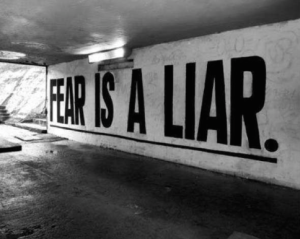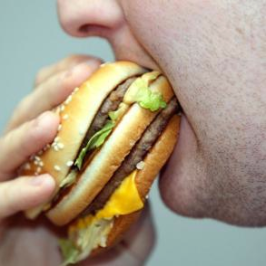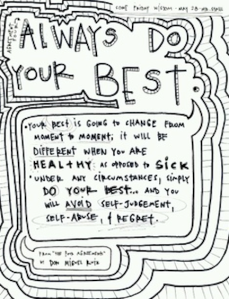
Approximately 20.9 million people over the age of 18 suffer from some type of mood disorder. Depression affects 14.8 million or 6.7% of Americans. I happen to be one of those 14.8 million people. Depression is very personal to me. I suffered internally for a very long time. I likened my feelings to a great war where my positive self almost always lost the battle. Depression affects you mentally, physically and spiritually. Sadness, at many times, literally is pain. The trouble with depression is the stigma of it all. I personally felt as if I was somehow defective as a human being.
Too many people ask others to simply “be happy” without taking the time to ask if there may be a deeper, more serious issue. I was strong enough to finally seek help and blessed enough to take a leap of faith. Getting to know people who showed me new ways of dealing with my emotions. Not everyone has found that strength or been so lucky to have people near to listen and understand. Because of this I wanted get more information on depression, what causes it and how you can help a loved one or more importantly yourself if you notice feelings of seemingly unending sadness. I got in contact with the Counseling Services office at Drexel University to get the facts about depression. Luckily Scott Sokoloski Ph.D., staff therapist, was more than happy to lend me his professional expertise on the subject.
What is depression? Are there different types or degrees of depression? Are there clinical terms to describe these varying conditions if so?
Scott – “The term Depression refers to a disturbance in mood that is characterized by varying degrees of sadness, loneliness, hopelessness, self-doubt, or guilt. While most people may experience one or more of these symptoms at some point in their lives, for some the feelings can last much longer or happen much more often than others. There are varying levels of Depression:
- Mild depression, symptoms are normally brief or may only minimally impact someone’s activities. Some people may call this “the blahs” or simply “feeling sad,” and it often goes away quickly.
- Moderate depression involves symptoms that are more intense and may last for a longer period of time. A person may find it more difficult to function on a daily basis, but generally can find ways to cope with their feelings with some help. In some cases, a person may begin to consider suicide as an option.
- Severe depression can result in a loss of pleasure in all activities, extreme fluctuations in mood, and intense feelings of hopelessness. A person may withdraw from most or all activities, and have almost no motivation to interact with others. Suicide risk increases with individuals who are severely depressed.
“When diagnosing Depression, we look at a few different factors. A person can have one Major Depressive Episode of varying severity that is a one-time event, but that same person may also have additional episodes throughout their lives that are separated by a period of time when they’re not clinically depressed. In this case we would diagnose Major Depressive Disorder, Recurrent, Mild/Moderate/Severe. We also have to rule out whether or not their symptoms may be due to another mental health disorder such as Substance Use/Abuse, Schizophrenia, or Bipolar Disorder, or due to a medical condition.”
How can we differentiate between clinical depression and shorter periods of sadness?
Scott – “People undergo periods of time when they experience stressors, significant change, the death of a loved one, or other day-to-day concerns. Their natural response to such situations may include feeling sad, lethargic, less motivated, or indifferent, along with physical symptoms such as brief changes in appetite or sleep. In most cases, people are able to adapt to these situations while continuing to function in their daily lives. Clinical depression affects all aspects of a person’s life. It impairs our ability to sleep, eat, work, and get along with others. It damages our self-esteem, self-confidence, and our ability to accomplish everyday tasks. People who are depressed find daily tasks to be a significant struggle. They tire easily, yet cannot get a good night’s sleep. They have no motivation and lose interest in activities that were once enjoyable. Depression puts a dark, gloomy cloud over how we see the world, our future, and ourselves. This cloud cannot be willed away, nor can we ignore it and have it magically disappear.”
What are some of the classic signs of depression?
Scott – Symptoms of depression may include:
· Becoming over-emotional (crying uncontrollably, lashing out on others), or possibly becoming emotionally blunted and unresponsive)
· A lack of interest and/or inability to find pleasure in activities
· Feelings of hopelessness and/or worthlessness
· Complaints about lack of energy or fatigue
· An exaggerated sense of guilt or self-blame
· Loss of sexual interest and desire
· Change in sleep habits, such as insomnia or increased need for sleep
· Poor concentration, impaired memory, indecisiveness
· Neglecting one’s appearance
· Increased irritability
· Dissatisfaction with life in general
· Reduction in the ability to cope with stress
· Change in appetite, either increased or significantly decreased
· Physical complaints such as headaches, muscle pain, stomach pain, or nausea
· Suicidal ideation
Intrigued? I surely was! Some of these symptoms were classic of myself, and others I know who struggle with depression. Keep an eye out for the remainder of this very informative interview with Scott, in Some Wounds Don’t Show, Part II.
Photo Credit: http://www.recovery.org/topics/depression/















